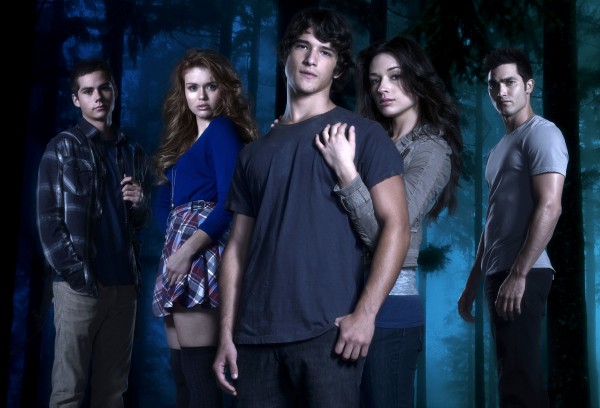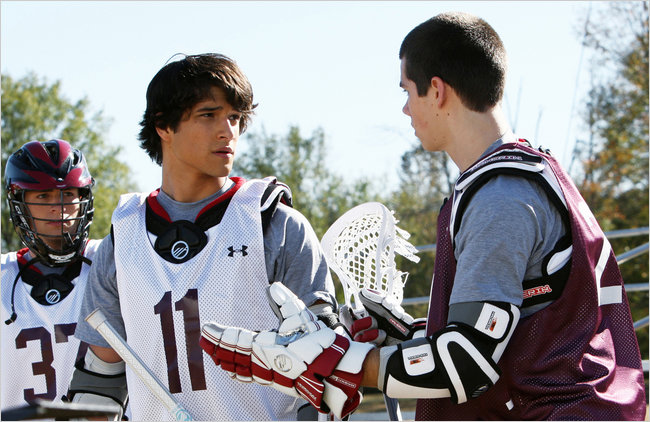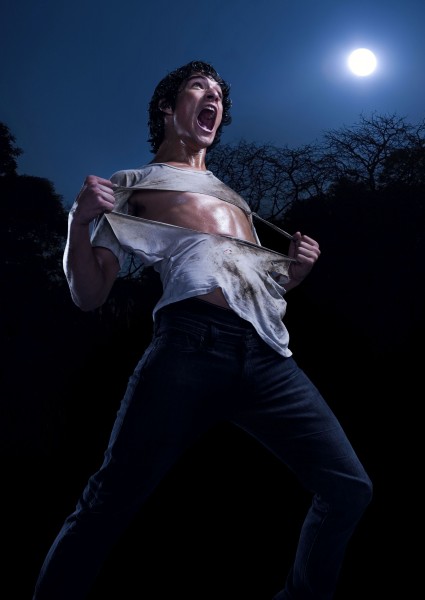The unexpected brilliance of “Teen Wolf”
I watch a lot of TV. I freely admit that some of it is crap. I also see a lot of horror films, and I likewise freely admit that some of them are crap. While a stylish, classy horror film is a thing of beauty and a joy forever, the simple truth is that I also really enjoy a good schlockfest. There’s nothing like “Deadly Friend”, “Chopping Mall” or “Cellar Dweller” to while away an evening. Oh, and let us not forget “I, Madman” (which, poor thing, doesn’t even warrant its own Wikipedia entry). I will defend the good stuff, but I’m not ashamed to own the crap.
Horror on TV, though, has been (no pun intended, but take one if you like) a bit of a crapshoot, especially of late. I’m thinking of anthology series like Showtime’s “Masters of Horror”, which started off well but deteriorated quickly after the first season. Or NBC’s “Fear Itself”, interesting but thuddingly mediocre overall, with one stunning exception: a twisted zombie story called “New Year’s Day”. Has it really been so long since “Kolchak: The Night Stalker” and “Night Gallery”? I guess it has.
So, although I was dubious at first—highly so, in fact—now I find myself wondering if I’m the only person on the planet who thinks that MTV’s reboot series “Teen Wolf” isn’t that bad? That maybe, just maybe, it’s actually pretty good? That it is, in fact, kind of…weirdly…brilliant? The other night—I think it was after watching episode four—I turned to Chuck and said as much, and he didn’t actually disagree. Thus justified, or at least emboldened, I’ve been thinking about the reasons why. I waited until after episode five to formulate my conclusions, just to make sure I wasn’t making any snap judgments. Things can always change, of course, but so far what I’ve seen has been pretty consistent, so I feel safe or at least comfortable in my analysis, such as it is.
Taking horror seriously is a good idea.
Funny horror, if not perfectly executed, rings false and grows tiring. I’m not arguing that this is a rule with few exceptions so much that the balance here is difficult, even almost impossible to strike. The sheer, unadulterated genius of “Beetlejuice” springs instantly to mind; I watched it again recently with my friend LeeAnn (who had never seen it! O, the shame!), and it still works—gloriously. (“I myself am…strange and unusual.”) But it is, make no mistake, a rarity. For every “Beetlejuice,” there’s a…well…a “Teen Wolf”. Or fifty. In a fairly radical break from its in-name-only forebear, MTV’s “Teen Wolf” (hereinafter referred to as MTVTW), takes the horror seriously—hell, there’s a horribly mutilated victim in the very first episode—and in my opinion is the better for it.
Thankfully, it isn’t too serious, Sturm und Drang serious, so serious as to lose all life and perspective. (I’m thinking of Spike’s “Blade” series, notable for being the only time any Spike programming has landed on our DVR (please don’t judge me). I liked the movies to varying degrees—“Blade” is great, “Blade II” is absolutely freaking brilliant, and “Blade: Trinity” …um…has a great title and co-stars Ryan Reynolds. I liked a lot about the series, too, but overall it was far too serious for its own good, and in the end nobody cared. No, MTVTW knows how to bring the humor. On the one hand, I shudder to think about the story meeting where somebody proposed the idea of a “comic sidekick”; on the other hand, I hope that writer is still on the show. Because the result is Dylan O’Brien’s appealingly portrayed best-buddy-to-the-hero, Stiles. We learned in episode five that Stiles isn’t actually his name—he just prefers Stiles to his apparently embarrassing yet still undisclosed first name. The non-reveal reveal of that moment made me laugh out loud. This is the kind of quiet comedy that orbits Stiles, zipping and crashing around like an asteroid belt. You never know when funny sparks are going to fly.
Tweak the mythology.
Everybody knows the basic story: boy meets dog, dog bites boy, boy turns into dog. This story has been told for centuries, from story-legends passed on verbally around crackling campires to CGI extravaganzas intended to hook the new generation (and spawn a movie franchise…or, you know, not). This story, like any other, has changed over the years of its telling; after all, storytellers embellish. Why not, if it makes things more interesting? Now, when I talk about “tweaking the mythology” I’m not talking about angsty, dewy-eyed, sparkly boy-toy vampires. (Nope, no link. You know what I’m talking about.) I am at least hoping for something far more interesting. I’m talking about the kind of enhancements that (speaking of vampires) make the ongoing storylines of CW’s “The Vampire Diaries” so much more intriguing and enjoyable than you’d think they have any right to be. (Rings that let vampires walk in daylight? Where did they get them? Who all has them? I must know more! TVD, from whose playbook MTVTW seems to have borrowed a judicious idea or two, is another show that gets a lot of things right.) Here, the main tweak is still being fleshed out, but it has something to do with different types of werewolves: run-of-the-mill pack wolves vs. some kind of super “alpha” wolf.
It seems clear that there’s more than one method to the madness. One smart outcome here is that our recently bitten title character (Scott McCall, played by Tyler Posey), who now turns into a fairly standard-issue werewolf, is actually a hero we can root for, not a tragic figure or anti-hero. Win the big game! Kiss the girl! Don’t get found out! It’s a familiar model, but in an unexpected setting. Beacon Hills is Smallville, Tyler’s Scott McCall is Clark Kent, the wolf is the hero…really, it’s not too big a stretch. And it’s a good idea. It also allows for fairly minor rather than elaborate makeup (or expensive CGI) on the title character (along with occasional glowing yellow eyes, just for emphasis), which keeps him recognizable and accessible. But make no mistake—there’s still another Bad Wolf, and at least one whose allegiances are in flux. It’s a lot to keep track of, but it’s also interesting.
People like to look at pretty people.
It’s true. We do. That’s why movie stars and models are all beautiful. (Well, those strange American Apparel ad campaigns aside. They’re like the anti-Abercrombie & Fitch.) This is not exactly new news—any number of CW shows get this much right, if nothing more, but that alone doesn’t make them watchable. Believe it or not, the trick is to make sure the pretty people are window dressing, not the main attraction. For your consideration, MTVTW offers (in no particular order):
- Model-turned-actor Colton Haynes, not the best actor in the world but still model-pretty and fairly passable as an extraordinarily frustrated jock confused by a high school dynamic that’s even stranger than the norm.
- Smokin’ hot Tyler Hoechlin, all grown (and buffed) up since traveling the Road to Perdition with Tom Hanks, and rocking a triskelion-ish tattoo across his shoulder blades, no doubt just for the exotic mystery.
- Crystal Reed and Holland Roden, lovely ladies indeed, all dewy eyes, shining hair and warm voices. There’s also Jill Wagner as tough-as-nails Kate Argent (get it?), a wolf hunter who will no doubt bring tension, angst and conflict to Our Hero and his Trusty Sidekick.
- Speaking of which—Dylan O’Brien, geeky but not too much so and terrifically appealing. The perfect sidekick; he’s funny, devoted and—perhaps most importantly—completely non-threatening. There’s no subtext in this relationship, none at all.
- Pocket-sized yet impressively fit Tyler Posey, who’s more cuddly wolf-pup than slavering beast. It’s surely no coincidence that he has shaggy hair and big, brown puppy-dog eyes that are noticed (and commented on) not just by the viewing audience but by other characters…the better to go with his occasional wolfy sideburns, my dear!
Truly, there’s nothing that works like knowing your target audience.
Make your young actors not too old.
There’s a fairly common problem with TV shows set in high school: the actors are usually too old to pass as teenagers, if not at first then certainly over time. Yes, “BH 90210” and “Glee” , I’m looking at you. What adults do watch these shows may not notice or care, but actual teenagers will know the difference. Of course, like any others the actors on MTVTW will age, noticeably so if the series runs for more than a couple of years, but for now at least they aren’t too old—Tyler Posey is actually still a teenager (he’s 19, at least for a few more months), and Dylan O’Brien is only a couple of months older. It’s nothing like poor 28-year-old (and, eventually, 38) Gabrielle Carteris trying to pass for 17 or so. Oh dear. And, much as I like his character, Mark Salling isn’t really believable as a high-schooler any more, either. Send ‘em off to college!
Keep things happening. Keep things interesting.
Like TVD (and, I would argue, the usually nonsensical but always guilty-pleasurably watchable “V” remake), MTVWD knows its audience. On a show like this, stuff needs to happen. It doesn’t have to make sense, but it has to be interesting. When I say “happen,” I don’t mean every episode—I mean every commercial interval. When I say “interesting,” I mean it has to grab your attention—and keep it until the next thing happens. And when I say “it doesn’t have to make sense,” I pretty much mean that 100%. Who cares if it’s silly? Please—it’s a show about a teenage werewolf! I’m going to give credit to director Russell Mulcahy (“Highlander” —I know, right?) and writers Tim Andrew and Toby Wilkins for getting things off to a tight, intriguing start.
Lacrosse.
Every burgeoning young superhero needs a setting in which to express his super side, ideally without giving away the farm (so to speak). Clark Kent had football, and Scott McCall has lacrosse. Lacrosse? Who plays lacrosse? People on the East Coat, that’s who—and, perhaps not so coincidentally, although it’s set in a fictional small Northern California mountain town, MTVTW is filmed in and around Atlanta, home of any number of youth lacrosse teams. Aha, suddenly it all makes more sense! Sure, maybe it’s because the local actors and extras already know how to play lacrosse. Sure, maybe it’s because the high school location has a lacrosse field but no football equipment. Who cares? Lacrosse fills the clichéd dramatic need for ritualized conflict without being itself a cliché. Our Hero needs to play a sport—it’s what boys in high school do—but his sport of choice happens to be one you’ve probably never played. This is clever, as it allows the necessary imagery to be familiar, yet still fresh. Unsurprisingly, it also allows for scenes played out in the locker room, which as everyone knows is simply de rigeur in horror, not to mention Youth TV.
Credit where credit is due.
No populist exercise in dramatic storytelling that follows a traditional narrative structure (so, not “The Tree of Life” ) can succeed without characters the audience can get its collective grip on, fairly quickly at that, and a hero (or antihero) who is likeable (or not) but most of all relatable. If you and I as viewers can’t connect to the protagonist on some level, we’re unlikely to care how things play out for him or her. I think this is the single biggest thing that was gotten wrong (repeatedly, it must be said) by both “FlashForward” and “The Event” (which at our house was mostly called “The Non-Event”). Did you care what happened to Joseph Fiennes (egregiously miscast) in “FlashForward”? Did you care what happened to Laura Innes (egregiously wasted) or Blair Underwood (egregiously overly made-up, at least in HD) in “The Event”? Neither did I. But, very interestingly, I do care what happens to Scott McCall, and that’s almost entirely due to Tyler Posey. He is, at times awkwardly but always earnestly, acting and emoting his ass off. Each. And. Every. Week. Who knew that the kid from “Maid in Manhattan” had it in him? I don’t know if he’s the Real Deal or not, at least not yet, and he may not be MTVTW’s greatest asset, but I do think he’s its secret weapon.
In its own arguably un-ambitious, self-deprecating way, MTVTW is fairly balls-out brilliant. Honestly, I haven’t enjoyed a new horror series on TV this much since TVD. It’s no “Supernatural”, but then what is?
Hey, maybe next time I’ll tell you why you ought to be watching “Falling Skies”!








